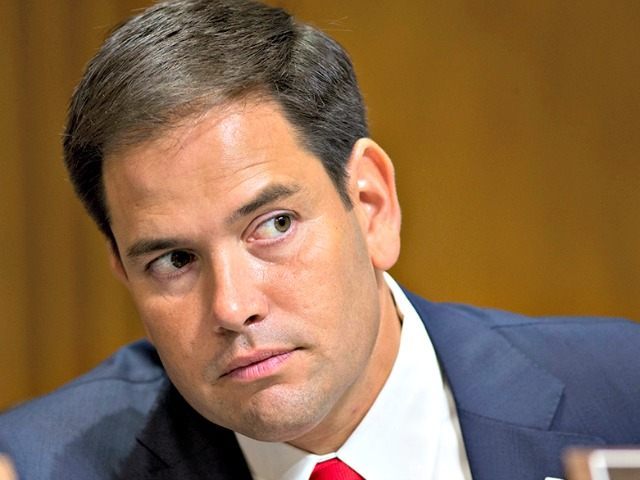In a Monday town hall in Iowa, Marco Rubio employed a deceptive rhetorical trick to mislead voters about his longstanding support for citizenship for illegal immigrants.
At the town hall, an Iowa voter asked Rubio simply: “Yes or no question: Do you support a path to citizenship for illegal aliens?”
Rubio replied, “I have personally said that I am open to them being able to apply for – not be awarded – apply for a green card. You can’t apply for citizenship, you can apply for a green card.”
What Rubio did not explain is that obtaining a green card is a path to citizenship.
Under U.S. immigration law, in order to apply for U.S. citizenship, one must first apply for a green card. Thus, Rubio’s assertion that “You can’t apply for citizenship, you can apply for a green card” is not only nonsensical, but even seems deliberately deceptive. In other words, rather than telling the voter that he supports a path to citizenship, he seems to be relying on the fact that the voter doesn’t know what a green card is. In telling her that he supports a path to a green card, he seems to be hoping that the voter, and the media covering his comments, don’t realize that a path to citizenship and a green card are the exact same thing.
Anyone who has a green card under U.S. immigration has the right to apply for and receive U.S. citizenship. A green card is the only path to citizenship under our current immigration system. Indeed, the path to citizenship in Rubio’s Gang of Eight amnesty bill– as in previous amnesty bills– allows illegal immigrants to apply for U.S. green cards—i.e. the only legal mechanism by which immigrants apply for citizenship.
Thus Rubio’s declaration– “you can’t apply for citizenship, you can apply for a green card”– would be the equivalent of the Iowa voter asking Rubio: “Yes or no—do you support tax hikes,” and Rubio responding by proclaiming, “No, I don’t support a tax hike— I support tax increases.”
This is not the first time Rubio has relied on this rhetorical technique.
Indeed, at last month’s GOP debate, CNN’s Dana Bash asked, “Senator Rubio, you co-authored a bill with Democrats two years ago that allowed a path to citizenship for undocumented immigrants. Do you still support that path to citizenship, which means giving those immigrants rights, like the right to vote?”
After Rubio initially sought to dodge her question, Bash followed up: “Senator, you haven’t answered the question. You described a very long path, but does that path end at citizenship?”
In his response, Rubio once again used his “green card” talking point, presumably hoping that Bash and the millions people watching did not realize that a path to citizenship and path to a green card are interchangeable.
Rubio said, “I’ve answered that question repeatedly…. I personally am open to allowing people to apply for a green card.”
As Byron York pointed out at the time, Rubio, in his response to Bash, “avoided the word ‘citizenship.'” York observed that Rubio’s response was “not terribly different from the scheme Rubio wrote into the Gang of Eight.”
Similarly, in a November interview with Sean Hannity, Rubio declared, “Now the majority position in our party is it should stop at just a work permit… I personally am open to allowing people to apply for a green card.” Once again, Rubio declined to point out that a green card is a path to citizenship and was precisely how illegal aliens received citizenship under the Gang of Eight bill.
Another example was in an October interview with CNBC’s John Harwood. Rubio said, “I have always said that I’m open to people having access to apply for a green card. I don’t think it’s good for American to have millions of people here permanently living in the country who can never become Americans. There’s a significant number of people out there who believe that they should never get that. They should only be allowed to have a work permit. So that debate in and of itself it is not going to be easy.”
Once again, Rubio did not inform listeners that when he said he wanted to give green cards to “millions of people” who can then “become Americans,” what he is referring to is American citizenship.
While Rubio has expressed his desire to enact his amnesty policies in numerous interviews and live presidential debates, he is simultaneously running an ad in Iowa claiming that he is against amnesty, which seems to raise certain questions with regards to his credibility on the subject.
In the ad, Rubio says claims that he supports amnesty are “false attacks.” “Don’t fall for it,” Rubio says in the ad, “When I’m president there will be no amnesty.”
Rubio used this same talking point when he introduced the Gang of Eight bill– declaring, “No one gets amnesty.”
Similarly, just last week, Rubio insisted that the Gang of Eight bill was not amnesty. Rubio told Bret Baier, “I do not support amnesty, and I never have.” That means that, under Rubio’s own definition, he could enact the Gang of Eight of bill or identical policies as President while not violating his statement that “When I’m President there will be no amnesty.”

COMMENTS
Please let us know if you're having issues with commenting.